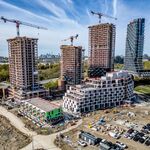syn
Senior Member
I remain skeptical. More to the point, the "suburbs will soon end" refrain has let urban leaders escape any meaningful oversight. The idea that there will be some inevitable collapse of the 905 just provides an excuse to ignore Toronto's inhospitable tax climate (most of wich doesn't fund stuff like "infrastructure" per se), poor growth figures and penchant for over regulating. It's totally faith based and kills protectiveness. We're like the poorer stupider cousin who found god and thinks Heaven will be better than life.
As long as the 905 sucks up nearly all of the new immigrants and jobs, there will be development and reinvestment in infrastructure.
That isn't true. The city has addressed business taxes, though things will not change as quickly as people would like (and perhaps as fast as they should).
The issue here is that people are citing an unsustainable business model as the one to follow. All of the issues that the city faces will be ones the suburbs will eventually have to face too. Mississauga is already starting to face them. It's like pointing to cheap housing in the suburbs and suggesting the city is doing something wrong due to higher housing prices. Suburban housing prices aren't going to stay down forever, and like taxes, they're already going up in Mississauga.
I don't know if you checked the list out, but Vancouver and Montreal are near Toronto at the bottom of the list too. Suburbs being able to offer lower corporate taxes is nothing new - in the GTA or anywhere else.




